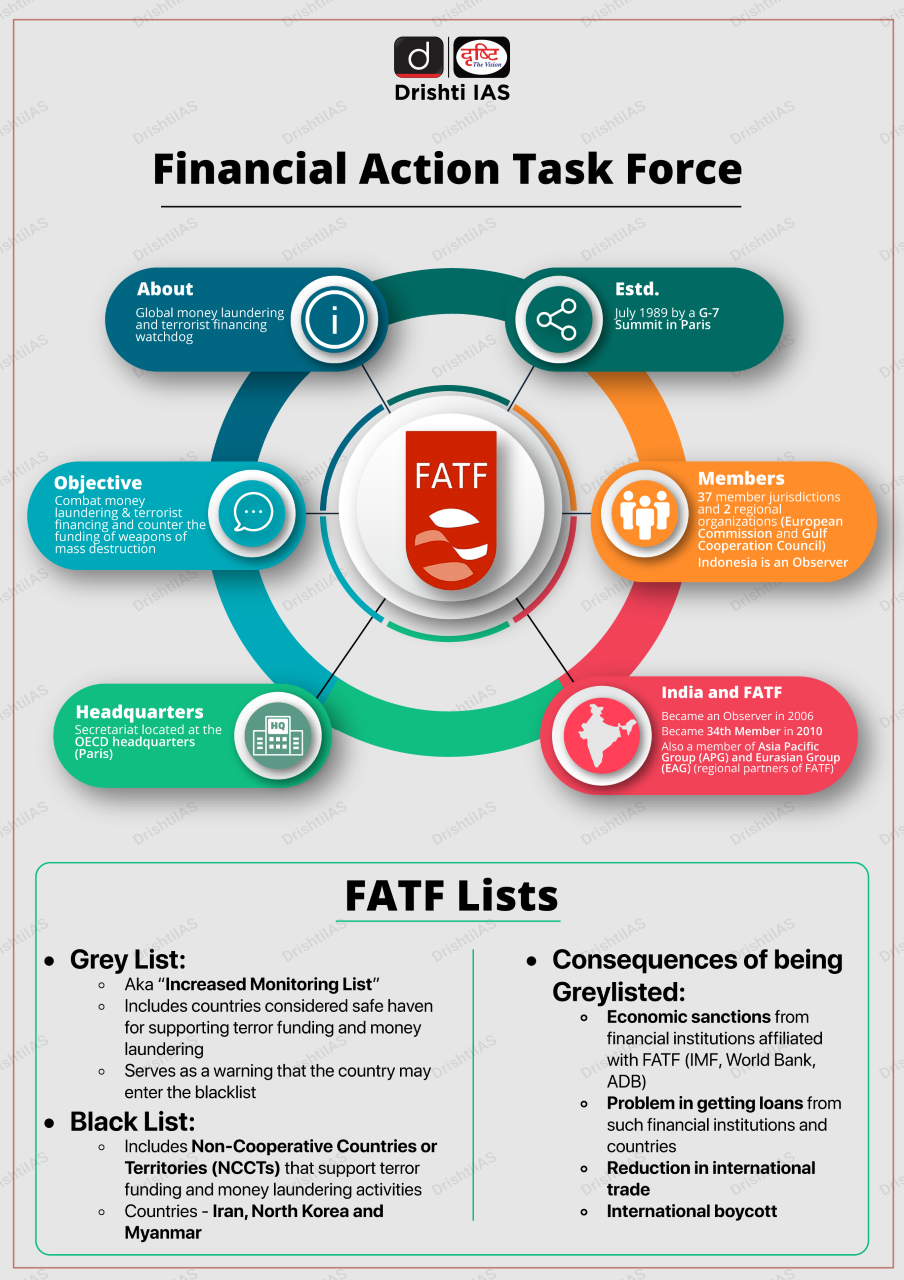Internal Security
Crowdfunding for Terrorism Financing: FATF
- 17 Nov 2023
- 7 min read
For Prelims: Crowdfunding for Terrorism Financing, FATF (Financial Action Task Force),Popular Front of India (PFI), Terrorism.
For Mains: Crowdfunding for Terrorism Financing, Money-laundering and its prevention, Role of external state and non-state actors in creating challenges to internal security.
Why in News?
Recently, FATF (Financial Action Task Force) has released a report titled-”Crowdfunding for Terrorism Financing”, highlighting that violent extremist organizations have employed well-structured networks for fundraising purposes.
- The report makes a reference to the Popular Front of India (PFI) as having resorted to solicitation for funds at mosques and public places, which were ultimately used to procure arms and ammunition and for training the cadres.
What is Crowdfunding?
- About:
- Crowdfunding is a dynamic fundraising method that leverages online platforms to gather small contributions from a large pool of individuals for various purposes such as supporting charitable causes, funding startup ventures, or financing creative projects.
- While crowdfunding is predominantly used for legitimate purposes, recent events have exposed its potential exploitation for illegal activities, notably by terrorists and terrorist groups.
- These entities utilize fundraising platforms and social media to solicit financial support globally for their extremist causes.
- Methods of Misuse for Terror Financing:
- Abuse of humanitarian, charitable and non-profit causes which can act as a front to raise funds for terrorism.
- Dedicated crowdfunding platforms or websites which, given the volume and variety of activity, makes it difficult to detect illicit activity.
- Social media platforms and messaging apps to allow extremists to amplify their messages and lead users to specific fundraising causes.
- Interaction of crowdfunding with virtual assets, including the use of privacy coins and anonymity enhancing services such as tumblers and mixers.
What are the Key Highlights of the Report?
- Mixed Fundraising Strategies:
- The PFI collected funds through solicitation at religious places, such as mosques, and public spaces.
- Additionally, the group used modern digital methods, including the circulation of QR codes and bank account details to encourage donations.
- Funds collected by the organization involved both domestic and foreign transactions, making the investigation challenging due to the multi-dimensional nature of the financial flows.
- Diverse Use of Funds:
- Funds raised through crowdfunding were not limited to a single purpose. A portion of the collected funds was invested in businesses and real estate projects, aiming to generate a regular income for the organization's terrorist activities.
- Global Context:
- The report places the issue of crowdfunding for terrorism financing in a global context. It highlights that while most crowdfunding activities are legitimate, terrorist organizations like ISIL (Islamic State of Iraq and the Levant) and Al-Qaeda have exploited these platforms to raise money for their activities.
- Recommendations:
- The FATF report emphasizes the need for consistent Anti-Money Laundering and Counter-Terrorist Financing (AML/CFT) regulations on a global scale.
- It points out that many countries do not systematically assess the risks associated with crowdfunding activities, leading to a lack of comprehensive data about its misuse.
- FATF highlights the cross-border nature of crowdfunding campaigns and the associated financial transfers.
- Countries are urged to recognize that even if their jurisdiction does not have significant domestic terrorism activity, it can still be used as a pass-through for financial flows.
What is PFI?
- The Popular Front of India formed in 2007 through the merger of three Muslim organizations in southern India in Tamil Nadu, emerged in the aftermath of the ban on the Students Islamic Movement of India (SIMI) and has been involved in various social and Islamic religious activities among Muslims.
- The PFI has presented itself as an organization advocating for the rights of minorities, Dalits, and marginalized communities but has faced allegations of involvement in extremist activities.
- In 2022, the Ministry of Home Affairs had declared the PFI along with its associates or affiliates or fronts as an “unlawful association”..
How to Deal with Such Organisations while Preserving Civil Liberties and Ensuring National Security?
- Clear Legal Framework:
- Establish a clear and comprehensive legal framework that outlines the conditions under which an organization can be designated as a threat to national security.
- This framework should be based on constitutional principles, international Human Rights standards, and due process.
- Judicial Oversight:
- The judiciary can assess whether the government's actions are in accordance with the law and protect individuals' rights.
- Transparency and Accountability:
- Maintain transparency in the process of designating organizations as unlawful and disclose the reasons for such actions.
- Establish mechanisms for accountability and oversight to prevent misuse of the legal framework.
- Targeted Actions:
- Focus on targeting individuals or entities directly involved in criminal or terrorist activities rather than broadly targeting an entire organization. This approach minimizes the impact on innocent members and supporters.
- Intelligence and Surveillance:
- Enhance intelligence gathering and surveillance capabilities to monitor the activities of potential threats. Ensure that these actions are in accordance with the law and subject to oversight.
- Public Awareness:
- Promote public awareness about the dangers of extremist ideologies and the importance of reporting suspicious activities. Encourage the public to be proactive in safeguarding national security.
UPSC Civil Services Examination, Previous Year Questions (PYQs)
Mains
Q. Discuss how emerging technologies and globalisation contribute to money laundering. Elaborate measures to tackle the problem of money laundering both at national and international levels. (2021)
Q. Analyse the complexity and intensity of terrorism, its causes, linkages and obnoxious nexus. Also suggest measures required to be taken to eradicate the menace of terrorism. (2021)





